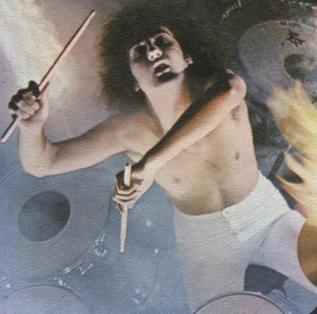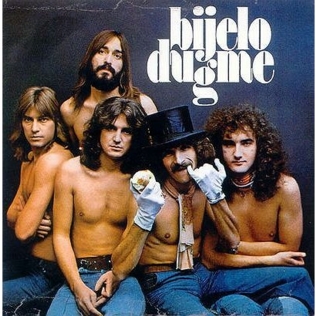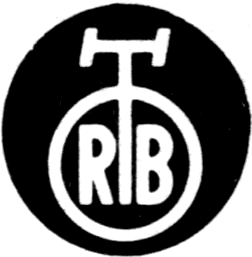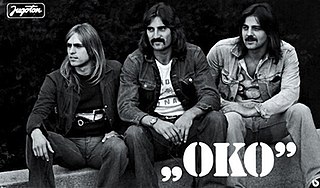
Ambasadori were a Yugoslav schlager pop band from Sarajevo, active from 1968 until 1980.

Goran "Ipe" Ivandić was a Bosnian rock drummer, famous for his work with the band Bijelo Dugme.
Jutro was a Sarajevo-based rock band most notable as the immediate predecessor to Bijelo Dugme. It existed from late 1971 until the very end of 1973 when it transformed into one of the most successful rock bands ever to come out of SFR Yugoslavia — Bijelo Dugme.

Želimir "Željko" Bebek is a Bosnian and Croatian vocalist and musician most notable for being the lead singer of former Yugoslav rock band Bijelo Dugme from 1974 to 1984. He also has a successful career as a solo artist.
New Primitivism was a subcultural movement established in Sarajevo, SR Bosnia-Herzegovina, SFR Yugoslavia in March 1983. It primarily used music, along with satire, sketch and surreal comedy on radio and television, as its form of expression. Its protagonists and followers called themselves the New Primitives.
New wave in Yugoslavia was the new wave music scene of the Socialist Federal Republic of Yugoslavia. As its counterparts, the British and the American new wave, from which the main influences came, the Yugoslav scene was also closely related to punk rock, ska, reggae, 2 Tone, power pop and mod revival. Some of its acts are also counted as belonging to the Yugoslav punk scene which already existed prior to new wave. Such artists were labeled as both punk rock and new wave.

Bijelo Dugme was a Yugoslav rock band, formed in Sarajevo, SR Bosnia and Herzegovina in 1974. Bijelo Dugme is widely considered to have been the most popular band ever to exist in the former Socialist Federal Republic of Yugoslavia and one of the most important acts of the Yugoslav rock scene.

Indexi was a Bosnian and former Yugoslav rock band popular in Yugoslavia. It formed in 1962 in Sarajevo, Bosnia and Herzegovina, and disbanded in 2001 when singer Davorin Popović died. Some of their most notable songs are "Svijet u kome živim" and "Negdje u kraju, u zatišju" with lyrics by Želimir Altarac Čičak, "Plima", "Sve ove godine", "Sanjam" and "Bacila je sve niz rijeku", which was later covered by many other ex-Yugoslavian groups, notably Crvena jabuka.
Buldožer, was a Yugoslav-Slovenian progressive rock band from the 1970s and 1980s. They were one of the first bands in communist Yugoslavia that could be considered Avant-prog, and forefathers of the Yugoslav new wave. In musical sense, they experimented with a variety of genres, while most of their lyrics, written in Serbo-Croatian, were a satire and mockery of the political and musical establishment, themselves included.
Zoran Redžić is a Bosnian musician, best known for playing the bass guitar in the popular Yugoslav rock band Bijelo Dugme.
Vladimir "Vlado" Pravdić is a Bosnian musician most famous as the organist of the Yugoslav rock group Bijelo dugme from 1974 to 1976 and again from 1978 to 1987.
Punk rock in Yugoslavia was the punk subculture of the former Socialist Federal Republic of Yugoslavia. The most developed scenes across the federation existed in the Socialist Republic of Slovenia, the Adriatic coast of the Socialist Republic of Croatia, the Socialist Autonomous Province of Vojvodina and Belgrade, the capital of both Yugoslavia and the Socialist Republic of Serbia. Some notable acts included: Pankrti, Paraf, Pekinška patka, KUD Idijoti, Niet, Patareni and KBO!.

PGP-RTB was a major state-owned record label and chain record store in the former SFR Yugoslavia, based in Belgrade, Socialist Republic of Serbia. After the breakup of Yugoslavia, in 1993, the company changed its name to PGP-RTS.

Music of Yugoslavia was the music of Yugoslavia.
Popular music in Yugoslavia includes the pop and rock music of the former SFR Yugoslavia, including all their genres and subgenres. The scene included the constituent republics: SR Slovenia, SR Croatia, SR Bosnia and Herzegovina, SR Montenegro, SR Macedonia and SR Serbia and its subunits: SAP Vojvodina and SAP Kosovo. The pop and rock scene was a part of the general Music of Yugoslavia, which also included folk, classical music, jazz etc. Within Yugoslavia and internationally, the phrases ex-YU or ex-Yugoslav Pop and Rock both formally and informally always refers to the SFRY period only, not including Federal Republic of Yugoslavia (1992–2003).

Založba kaset in plošč RTV Ljubljana or Založba kaset in plošč Radiotelevizije Ljubljana, was a major record label in the former SFR Yugoslavia, based Ljubljana, Socialist Republic of Slovenia. In 1990, at the start of the breakup of Yugoslavia, the name of the company was changed to Založba kaset in plošč RTV Slovenija. It was and still remains a leading publishing firm in Slovenia.

Repetitor is a Serbian alternative rock band from Belgrade.
The Maniacs are a group of Ultras of the Bosnian football club FK Željezničar Sarajevo. There are also subgroups like Blue Tigers, Joint Union, Urban Corps, Stari Grad and Vendetta.

Oko was a Slovenian and Yugoslav hard/progressive rock band formed in Ljubljana in 1972. Formed and led by guitarist and vocalist Pavle Kavec, Oko was a prominent act of the Yugoslav rock scene in the 1970s.

Jutro was a Yugoslav rock band formed in Ljubljana in 1970. Initially performing boogie rock and in the late 1970s turning towards jazz rock, Jutro was a prominent act of the Yugoslav rock scene in the 1970s.










